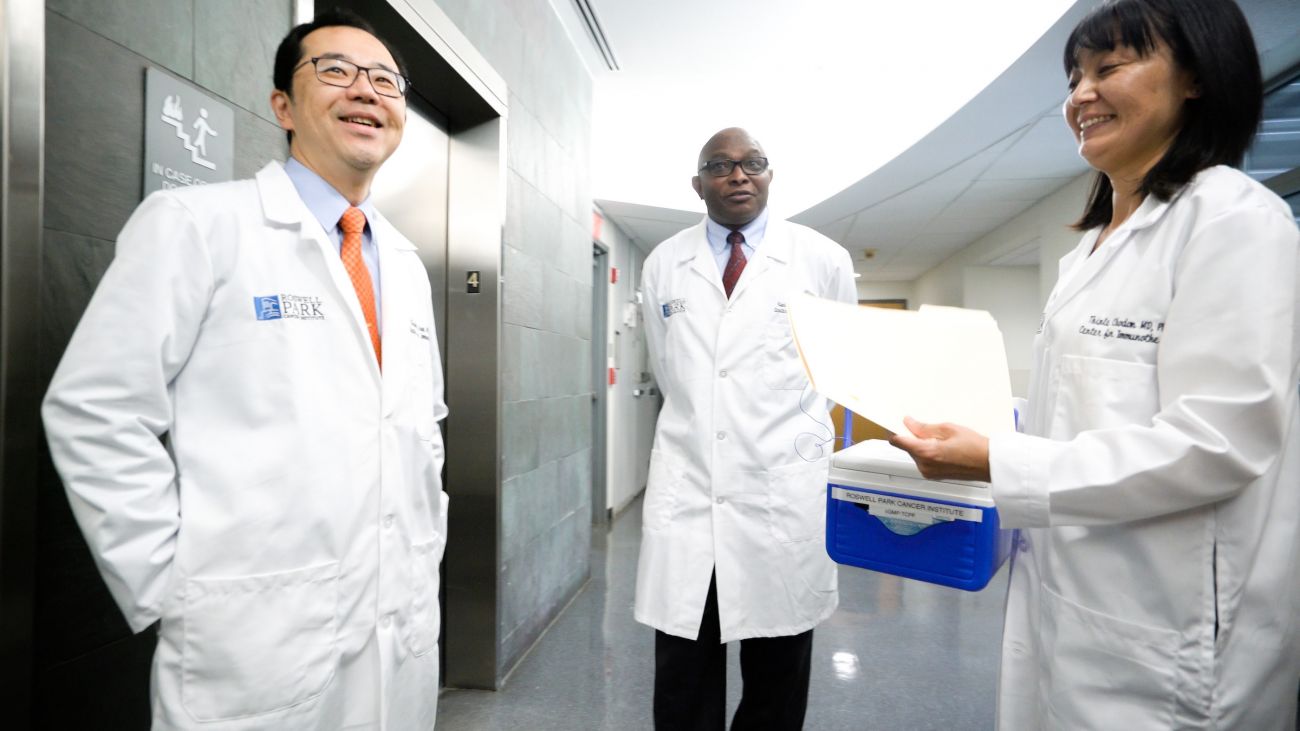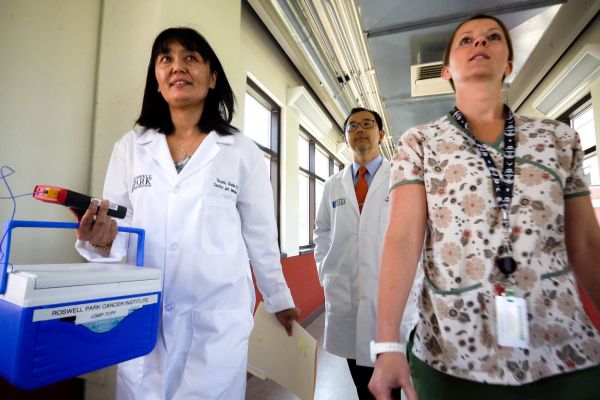This is the second in a series of three Cancer Talk blogs about a new immunotherapy developed at Roswell Park that is now being studied in patients who are enrolled in a phase I — “first in human” — clinical trial. It marks the first time a patient has received this specific type of adoptive T cell therapy anywhere in the world.
For more information about this clinical trial, please call 1-877-275-7724.
“Cancer cells are really smart,” observes Richard Koya, MD, PhD. “Chemotherapy, radiotherapy, surgery and even some immunotherapies may have some effect initially, but cancer cells have a way to evade them, to be resistant and grow back. That’s why it’s so difficult to treat cancer.”
As Associate Director of the Division of Translational Immuno-Oncology and Director of the Vector Development & Production Facility at Roswell Park, Dr. Koya spends a lot of time thinking about new strategies to help the human immune system outsmart cancer. One of those strategies, developed by Dr. Koya and Kunle Odunsi, MD, PhD, formerly the Deputy Director of Roswell Park Comprehensive Cancer Center and Executive Director of the Division of Translational Immuno-Oncology aims to deliver a two-pronged attack against cancer cells by super-charging the patient’s immune system. The therapy is being studied in patients for the first time through a phase I clinical trial, for which Dr. Koya serves as Scientific Principal Investigator and Dr. Odunsi as Clinical Principal Investigator.
Never miss another Cancer Talk blog!
Sign up to receive our monthly Cancer Talk e-newsletter.
Sign up!“Super Immune Cells”
Early last month, a patient with late-stage ovarian cancer became the first person to receive the treatment. Participating in a “first in human” clinical trial can come with serious risks, and in general, response rates to treatments offered in phase 1 clinical trials are low. But no standard treatments are available for patients at this stage, and life expectancy is limited. Considering all her options, the woman chose to enroll in this clinical trial.
In a process similar to a blood donation, her own T lymphocytes, or T cells — which are part of the immune system and help the body fight disease — were collected and sent over to Roswell Park’s Division of Translational Immuno-Oncology. There Dr. Koya and his team altered (or “engineered”) the T cells and multiplied them to create “an army of super immune cells.” The cells were then given back to the patient through an infusion.
What did Dr. Koya add to the cells?
- He armed them with specific T cell receptors (TCRs) that enable the T cells to hunt down and destroy tumor cells that express (or produce) NY-ESO-1. NY-ESO-1 is an antigen — something that triggers the immune system to create antibodies to attack foreign substances in the body. It is produced only by cancer cells — not healthy cells. This is important, because the engineered T cells, like a bloodhound following the scent of a criminal, will now find and destroy only the cells that produce NY-ESO-1.
- Next, the team added a second gene to protect the T cells from attack by a protein called transforming growth factor-beta (TGF-beta), which the tumor secretes to protect itself. “Many cancers, like ovarian cancer and melanoma, secrete a lot of TGF-beta,” explains Dr. Koya, “and TGF-beta kills the T cells that should be killing the cancer cells. TGF-beta is like poison for the immune cells.” Dr. Koya and his colleagues hope the engineered T cells will block TGF-beta, thus protecting the patient’s T cells and enabling them to continue fighting the cancer cells.
“Nobody else is doing the combination of these two different elements in the same platform anywhere in the United States or even on the planet,” says Dr. Koya.
Patient #1, who came to Roswell Park from out of state, returned to her home after receiving her engineered T cells. She will return to Roswell Park in six months to undergo testing that will show how her immune system is responding.
To be eligible for the trial, patients must have tumors that produce NY-ESO-1. The protein is expressed in about 30-40 percent of ovarian and melanoma tumors and in other types of tumors as well. “Initially, ovarian cancer, melanoma and some sarcomas are the three main targets,” says Dr. Koya, “but the clinical trial is open for patients with other cancers who meet the eligibility requirements.
“We are very excited to start this clinical trial,” he adds. “Yes, cancer cells are really smart. But we think we can be smarter.”
Stay tuned to Cancer Talk to learn about other clinical trials in the pipeline at Roswell Park’s Division of Translational Immuno-Oncology.
This is the second in a series of three Cancer Talk blogs about a new immunotherapy developed at Roswell Park.
Part 3: The ABCs of Immunotherapy — and What's in the Pipeline at Roswell Park

